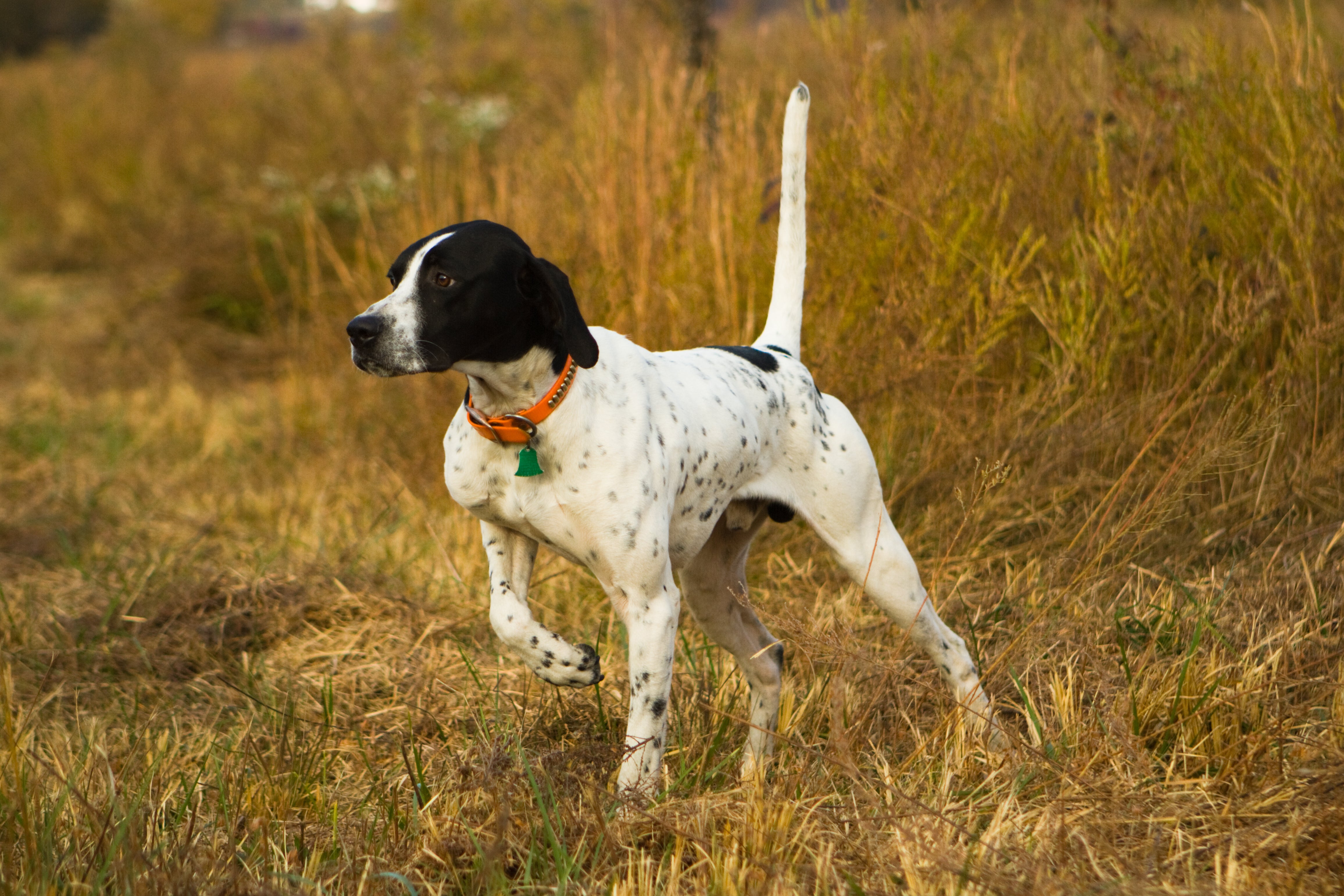Pointer
Pointer dogs stand tall with a tail and are muscular, graceful, and excellent at scent work. They’ve been depicted throughout art and history via their typical stance, with alert tails and raised forelegs and heads, all extended creating the breed's signature pose “pointing” for their owners. Their smooth, straight coats have a glorious sheen to them and are easy to maintain, although their insatiable need to romp outdoors might mean giving them lots of baths.
There are three types of Pointer dog breeds: English Pointers, Italian Pointers (Bracco Italianos), and Spanish Pointers. The English Pointer is a medium-sized athletic dog with a white coat that has either liver or lemon markings. The Bracco Italiano and Spanish Pointers, which are also known as Perdiguero de Burgos, have a chestnut or white coat. All three are affectionate, intelligent, and have strong instincts.
Breed characteristics carousel
Learn More
Need to Know
- Suitable for owners with some experience
- Extra training required
- Generally healthy breed
- Enjoys vigorous walks
- Large dog
- Some drool
- Requires grooming once a week
- Quiet dog
- Welcomes everyone happily
- Generally friendly with other dogs
- Gets along with other pets with training
- Great family dog
- Needs a large yard but can do well in suburban areas
- Can be left alone occasionally with training
- AKC Registered Breed

Personality
Now mostly companion dogs, Pointers are gentle, kind, and enthusiastic members of the family. They do well with other dogs and cats if introduced properly, and they bond closely with their families. They’ll love nothing more than jumping in the car with you for a day at the lake or a hike. Sensitive and intelligent, they rarely meet “strangers,” making everyone they meet a friend. They make decent guard dogs, barking if someone arrives at the door, but won’t be overly noisy.
The Pointer dog breed gets its name from its previous job—pointing while out on a hunt. The Italian Pointer is an ancient breed, descended from Roman dogs. They were versatile dogs, allowing them to withstand centuries of change and be adaptable. The Spanish Pointer is likely almost as old as the Bracco Italiano breed, with a key difference in the breed’s development to help it adapt to Spain’s terrain and climate. The English Pointer was developed in the 17th century to accompany the aristocracy.
While now mostly family dogs, all three breeds still excel in their original job of pointing, albeit today they might have more opportunity to chase down a backyard squirrel than anything else. They’ve stayed popular due to their obedience, alertness, and friendly nature.
Patience is key when training Pointer dogs. They are smart, elegant, athletic, and high energy and need owners who can cater to the Pointer’s needs. They won’t care a lick about the weather, so be prepared to spend time outside no matter what. Child-free homes or those with older children are best.
Free running will always appeal to dynamic Pointer dogs. Human companions will need to invest in good running shoes to keep up!
While they love curling up at their owner's feet, they do require a good bit of exercise and should have access to the outdoors. Pointers are athletic dogs with boundless energy and do their best with long daily walks and exhausting play sessions. A securely fenced yard is a happy medium for dog and family.
Low-maintenance grooming is the name of the game for these nose navigators. Pointers only need brushing during shedding season, but their coats should be regularly inspected for skin problems.
The Pointer dog breed is an intelligent, spritely one that will try their best to please their owners. They do well with scent work given their history and should be taught reliable recall since they can get distracted easily and enjoy nothing more than a wild romp through the woods.
If lacing up hiking boots, stomping around in mud, and spending a lot of time outdoors appeals to you and your family, Pointer dogs will make an excellent family dog for you.
The cost of a Pointer from a breeder is significantly more than the cost of adopting one from a local shelter or rescue. The adoption fee usually covers additional items such as spaying or neutering, vaccines, and microchipping.

Learn more about feeding and caring for your Pointer on Purina.
Did you know?
- Pointers are one of the oldest dog breeds in the world. They have been found depicted on the walls of 3,000-year-old Egyptian tombs and French and English paintings from the 17th to 19th centuries.
- The Pointer name comes from their history, where when spotting things for their owners, their entire bodies would “point.”
- The Perdiguero de Burgos, or Spanish Pointer, are particularly renowned for their endurance.
- Bracco Italianos are known for their unique pointing stance when they lock onto a scent. They will freeze and point their nose toward the source, often with a happy and determined expression.
- English Pointers were a highly prized breed by royalty and the aristocracy.
